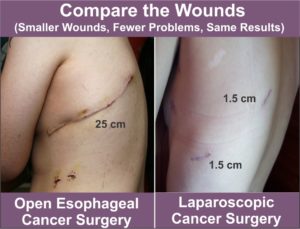
Diagnosed with Cancer? Your two greatest challenges are understanding cancer and understanding possible side effects from chemo and radiation. Knowledge is Power!
Learn about conventional, complementary, and integrative therapies.
Dealing with treatment side effects? Learn about evidence-based therapies to alleviate your symptoms.
Click the orange button to the right to learn more.
- You are here:
- Home »
- Blog »
- side effects ID and prevention »
- Minimally-Invasive Esophagectomy (MIE)-
Minimally-Invasive Esophagectomy (MIE)-

Several minimally invasive esophagectomy (MIE) techniques represent safe alternatives for the surgical management of esophageal cancer
When talking about esophagectomy for esophageal cancer, minimally-invasive treatment means robotic surgery to completely remove the cancer patient’s esophagus. The article below is comparing “open” or old-fashioned surgery to robotic surgery.
Robotic or minimally-invasive surgery seems to be replacing open cancer surgeries throughout the United States. In my 20 plus years studying cancer surgeries I have witnessed robotic surgery overtake traditional surgery for prostate removal (prostatectomy) bladder removal, now esophagus removal.
It is important to point out, however, the key for the EC patient to consider is how practiced the surgeon is at either open or MIE. By this, I mean that it is critical for the EC patient to determine the surgeon’s experience and historical performance with either/or open or MIE procedures.
The question for the cancer patient to ask him or herself is, “will my surgery have a better outcome if a robot or human does it?” And by “better outcome” you must look at several factors including:
- overall survival- will you live longer
- pain, recovery, quality of life
- cost
The answer currently is that the answer is a moving target. Some clinics are better than others. MD Anderson may have better/worse outcomes than Memorial Sloan Kettering for example. In the past 5 years, robotic surgery has grown and improved as surgeons have learned more and practiced more on patients.
The article/study linked below essentially reports that there is no difference between MIE and open surgery. That study was written in 2008. If you are reading this in today, you must do your homework accordingly.
Have you been diagnosed with esophageal cancer? Are you considering MIE? I am a cancer survivor and cancer coach. Scroll down the page, post a question or comment and I will reply to you ASAP.
Click now to go to the Complete Cancer Coaching Products store.
Thank you,
David Emerson
- Cancer Survivor
- Cancer Coach
- Director PeopleBeatingCancer
Minimally Invasive Surgical Treatment of Esophageal Carcinoma
“Surgical resection has proven successful in eradicating cancer of the esophagus, and it remains one of the main treatment modalities available for the curative management of patients with this disease. Unfortunately, patient morbidity is high because of the extensive nature of the surgery, which traditionally involves opening the chest and abdomen. Most time-honored techniques used to resect the esophagus and reconstruct the alimentary passage use the stomach as the replacement conduit, and a major abdominal dissection is therefore involved. Hoping to decrease the perioperative morbidity associated with esophagectomy, a number of thoracic surgeons have started to experiment with resection of the esophagus using the minimally invasive approach in select groups of patients…
The MIE Procedure
The chronology of events involved in dissection and determining the site of anastomosis are very much dependent on the habits of the surgeon. The procedure involves mobilization of the intrathoracic esophagus, the creation of a gastric conduit from the stomach, a subtotal esophagectomy, and proximal gastrectomy, and creation of an anastomosis in the chest or the neck between the residual native esophagus and the freshly created replacement conduit (Figure 1). A complete lymph-node dissection or sampling may also be included in the procedure if the surgeon believes that aggressive lymphatic dissection at the time of esophagectomy is useful…
MIE vs. OPEN RESECTION
Data comparing MIE with open surgery are accumulating. Most of these data are in the form of single-institution studies using historical controls for comparison. In the only published study comparing open surgery with MIE, Nguyen et al found that MIE was associated with less blood loss, shorter length of surgery, and shorter length of stay in the intensive care unit.8
In a systematic review of minimally invasive resection for esophageal cancer, Gemmill, and McCulloch9found, in more than 1,300 patients reported in the literature, a mortality of 2.3%, a morbidity of 46.2%, and a leak rate of 7.7%. Mean hospital stay was 11 days. These values are similar to those available for open surgery…
CONCLUSION
Minimally invasive resection of the esophagus for the management of esophageal neoplasia is feasible and safe. Based on the limited knowledge available today, short-term outcomes after MIE are at least comparable with, if not better than, outcomes associated with open procedures. Whether MIE is superior to the time-honored open techniques as an oncologic surgical procedure remains to be determined. Experience with abdominal surgeries has shown that minimally invasive techniques eventually prevail over open techniques, as long as the procedures do not jeopardize the basic principle of oncologic surgery—complete resection of the tumor and its lymph-node bearing territories.”


